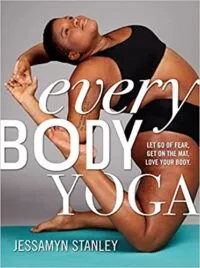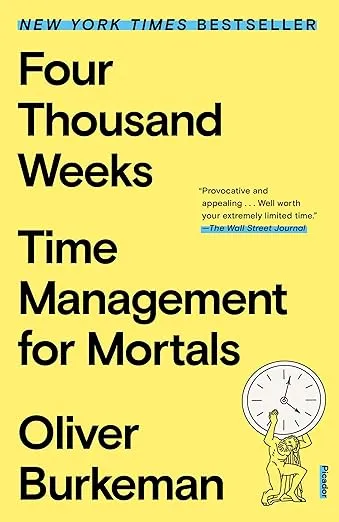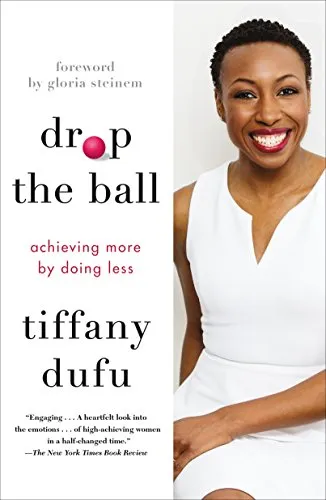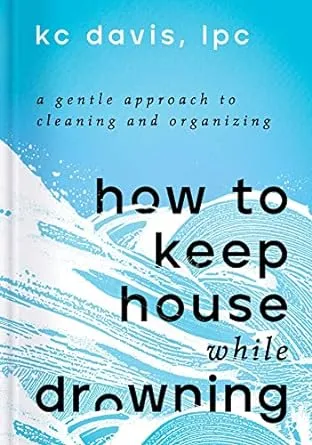
Books to Help You Stick to Your New Year’s Resolution
We’re a couple weeks into the new year, which means we’re just about at the point where most folks abandon their New Year’s resolutions. Whatever you call your goals for the new year—resolutions, intentions, vibes—and however you get there—step-by-step plans, a word for the year, navigating based on how you want to feel—you’re more likely to make progress if you’ve got good resources.
Today, we’re exploring books to support some of the most common New Year’s resolutions: getting clear on priorities, developing good habits, establishing a meditation/mind-body practice, and getting organized. Thinking about money, relationships, and etc? Those recs are coming in the next installment, hitting your inbox January 28.**
Get Your Priorities Straight
A new year feels so promising and full of possibility; it’s tempting and all too easy to set a million a goals. Trying to do all the things is a great way to guarantee that you won’t fully do any of the things, so it’s time to really dial into what matters to you. Oliver Burkeman’s Four Thousand Weeks: Time Management for Mortals puts aside tips and tricks to offer instead a philosophical framework for making decisions about how to spend your limited time on earth. (The title refers to the average human lifespan.) It’s a liberating combination of radical acceptance and permission to simply not do most things in order to do the few things that are most important to you really well, and it’s the best book I’ve ever read on the topic (and I’ve read…a lot).
For something more on the practical side, try Drop the Ball by Tiffany Dufu. While the book is positioned as a resource to help women learn to let go of responsibilities and assumed expectations that hold them back, it’s an excellent resource for people of all genders and in all kinds of family and work relationships. We found it so useful here at Book Riot that we assigned it to the whole company for discussion at a retreat a few years ago!
Already clear on your priorities, but feeling like everyone else is the problem? Run, do not walk, to Nedra Glover Tawwab’s Set Boundaries, Find Peace, which contains framework and scripts for creating, communicating, and enforcing boundaries in every kind of relationship.
Extra credit: Inciting Joy by Ross Gay is a gorgeous and, at times, challenging collection of essays that invite us to consider what real joy and connection look like.
Get Your Mind Right
If you’ve decided that 2024 is the year you’re going to develop a meditation practice, hello and welcome! There’s a pile of scientific evidence about the benefits of meditation, but knowing that something is good for you doesn’t actually make it any easier to do. Meditation has been part of my life to varying degrees for the last twenty years, and in that time, I’ve seen a lot of so-so resources and a couple of very good ones.
Dan Harris and Jeff Warren’s Meditation for Fidgety Skeptics is one of the great ones. Harris shares his own journey into meditation (a former network news anchor, he turned to meditation after having a panic attack on air, an experience he documents in the memoir 10% Happier), and longtime meditation teacher Jeff Warren provides short meditations from a variety of practices and schools of thought to help you discover what works for you. They start from the approach that “one minute counts”—you won’t catch them declaring that if you don’t meditate for twenty minutes twice a day, you’re doing it wrong—and in lieu of promising that meditation will change your whole life, they suggest that it might make you a very reasonable 10% happier. (10% Happier is also the name of their meditation app, which features a diverse array of experienced teachers and practices for modern life, including recent additions focusing on neurodivergence and ADHD.)
Pro-tip: listen to this one on audio (it’s included in Spotify Premium!) so you can experience Warren’s terrific guided meditations.

Yoga and meditation go hand-in-hand, and it can help to get the wiggles out before you sit. In Every Body Yoga, Jessamyn Stanley cuts through the bullshit of contemporary yoga culture to offer an inclusive, accessible, and often funny entry point to the practice. The book contains full-color photos and clear directions for 50 yoga poses, along with simple sequences to practice at home. Want to release fear, feel energized, and love your body? Stanley has you covered. And if you’re worried that you won’t be “good” at yoga or able to get into some of the postures, she also provides modifications to make the practice comfortable and tailored to your needs. This is yoga the way it’s meant to be.
Get Organized
The best organization systems are like the Ronco Rotisserie: you set it and forget it. You probably don’t need me to tell you about a little book called Atomic Habits, but maybe you need a nudge to pick it up. James Clear delivers on his name with clear, action-oriented advice for how to create new habits and combine them in ways that help you get as close to autopilot as humanly possible. When you make habits easy to keep, you don’t have to spend energy on willpower, discipline, and guilt.
If your work is dominated by screens and digital material, I can’t recommend Tiago Forte’s Building a Second Brain enough. This is a flexible, customizable approach to organizing all of the components of your life and work that exist online. It’s a bigger lift upfront for a great payoff down the road.
In How to Keep House While Drowning, KC Davis’s thesis is simple: “You don’t work for your home; your home works for you.” Also, this: “messiness is not a moral failing.” Amen, and hallelujah. Life can be A LOT, and Davis’s compassionate approach offers ideas for reframing your relationship to your to-do list alongside practical tips for keeping everything together enough without losing your mind in the process. We can probably all benefit from this book, but Davis recognizes that things like anxiety, depression, and ADHD can make cleaning and organizing especially difficult, and her methods take this into consideration.
And thus concludes our first installment of Better Living Through Books! Tune in next time for recommendations related to money, relationships, and more.
The comments section is moderated according to our community guidelines. Please check them out so we can maintain a safe and supportive community of readers!
The comments section is moderated according to our community guidelines. Please check them out so we can maintain a safe and supportive community of readers!
















Leave a comment
Join All Access to add comments.